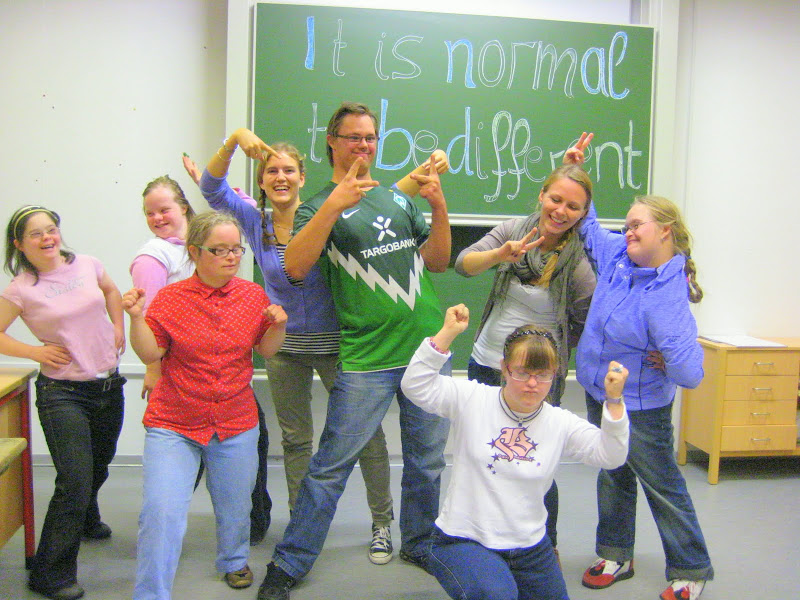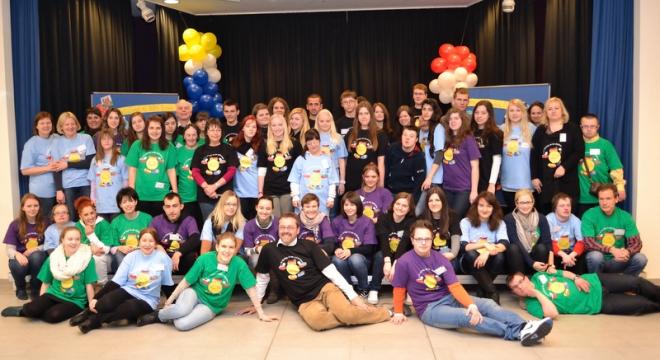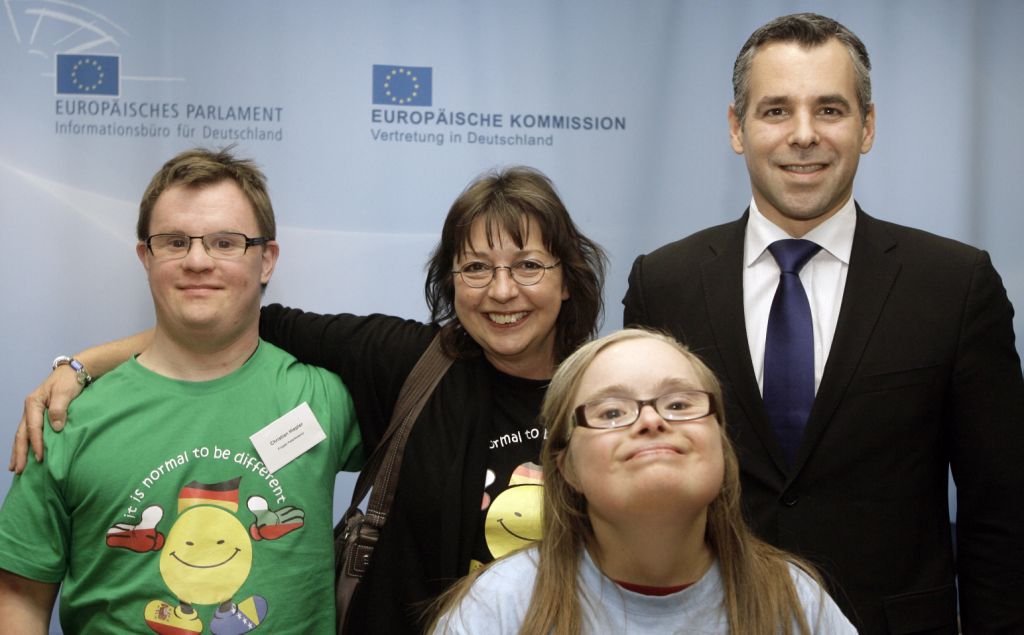"It is normal to be different" - Young Europeans with and without Down syndrome facing human rights
By Gisela Paterkiewicz
- Jan-Tore from Syke, Germany: quiet and modest, full of charm;
- Jan from Varna, Bulgaria: always serious, but when he laughs, the sun is shining;
- Michael from Torun, Poland: very self-confident, wants to become a police officer;
- Samira from Sarajevo, Bosnia-Herzegovina: helpful, competent assistant to teachers;
- Sebastian from Syke, Germany: computer-nerd, takes good photos;
- Lia from Saragossa, Spain: loves parties, surprises with constantly new hair-stylings;
- Kristina from Varna, Bulgaria: dances like the devil, speaks very good English;
- Peter from Warsaw, Poland: is a TV star, plays the piano;
- Carmen from Saragossa, Spain: has a great sense of humor, experts in handicraft work;
- Nikolina from Sarajevo, Bosnia-Herzegovina: gives professional media interviews, can do karate.

These are only few of the participants from five countries taking part in "It is normal to be different," half of them with Down syndrome. The difference I can determine after various European school projects since 1996 is that in this project the symbiosis of young people with and without Down syndrome has been a perfect mixture. When I look at the numerous videos and pictures now after two years, the young people are smiling and laughing in every picture, no matter if in Sarajevo, Syke or Torun. Everything seems colorful and happy!
This is what will stay in our memories, although there have been many serious situations due to the fact that a considerable part of the academic tasks given to the participants dealt with research about the sad past: euthanasia and forced sterilization in the Third Reich, social isolation of entire families with handicapped children until late into the 1980s, the inhumane conditions in institutions for the disabled, but also modern concepts of integration and inclusion – until today very different in our countries! And still horrifying for all of us was the visit to Auschwitz...
How did we get the idea? Since the 1990s when young Bosnian refugees passed their high school exams at our school, there has been a close friendship between High Economic School Sarajevo (just as to Economic High School Torun). But as Bosnia-Herzegovina is not a EU-member state, we could not apply for EU-funding and had to try to "scrape money together" from other organizations like the German-Polish Youth Office. Our applications to the Europeans for Peace program had been turned down several times.

Finally "It is normal to be different" made it to the shortlist and we were invited to a preparatory EFP-seminar in Berlin-Wannsee in May 2011. Due to their professional advice, it began to dawn on us what lay ahead of us – most of all – how could we possibly manage to bridge the gap between EFP's expectations, i.e. serious research about the past, and the Down-Syndrome parents' organizations, i.e. serious study of concepts of integration and inclusion? How could we give the participants with Down syndrome a fair chance in such a project? All communication had to be in the English language, and, on top of it, rather theoretically lopsided. Where could there be any fun?
However, we decided to divide the project into six phases – three preparatory phases and three one-week encounters in Sarajevo, in Syke and in Torun.
Three preparatory phases
Together with our high school students we carried out research, which was documented as videos and PowerPoint presentations:
- What is Down syndrome?
- What is everyday life of young people with Down syndrome like?
- What are their dreams, hopes and fears?
- How were disabled people treated in the past?
- Which are unusual achievements of people with Down syndrome?
So we visited various therapy centers, sheltered workshops, theatre groups etc. in our countries, interviewed young people/parents/educators and older time witnesses. Furthermore internet research about medical, historical and social dimensions. All progress was planned and discussed on our website www.eu-friends.eu in regular one-hour chats. Please open the link "Old Projects" and you will find countless documents from the preparatory phases and encounters.
Three project encounters
There was a group of each country travelling, usually consisting of about 5 high school students, 2 teachers, 1 or 2 young people with Down syndrome and assistants.
Each encounter had the same basic structure:
- Introduction of participants and little language course
- Presentation of the results of the preparatory phase
- Creative activities in multinational workshops
- Visiting the town guided by host students
- One-day bus excursion
- Public performance in the presence of politicians, prominent artists, the media etc.
- Big farewell-party
All encounters have been joyful, lively and impressive, but here I would like to mention three occasions which impressed me personally.

In Sarajevo, where still a lot of remains of the War were present, we were welcomed like VIPs. Famous actors, fashion designers and football stars came into the school to guide through the various multinational workshops. It was moving when the directors of the very new parents' organization DOWNSY told us that it was the first time people from outside asked them to do a project together, until then it had always been the other way round. We learned quickly that in countries with more severe economic difficulties than in Germany the people with special needs really do come last as.
In Syke we got creative support by the well-known Blaumeier-Group from Bremen preparing our public performance. Some girls were trained to be moderators in the show in acting workshops. Completely opposite to her – till then "cool" temperament - one girl with Down syndrome got extremely nervous speaking to such a big crowd of about 400 people. I was really upset sitting in the audience and asked myself what harm we were causing. Thank God, the girl asked only shortly afterwards if she could work as moderator again and said that she really had a great time.
It is normal to be different
In Torun, where Copernicus discovered the solar system in 1543, the drama group "Teatr 21" from Warsaw helped us creating a spectacular happening in front of the statue of Copernicus on Torun market square. In white painters' suits, participants presented the solar system and spoke their own texts in all languages of the projects countries:
"Jupiter, Saturn, Uranus, Neptune,
Each planet is different,
in shape, color and size.
That is the universe.
Every human being is different.
Every human being is like a planet.
It is normal to be different.
It is normal to be different.
It is normal to be different."
Conclusion
I believe that all of us have really learned from history although seemingly the historical aspects have taken up less room than the creative and musical activities. All participants were sensitized and had experienced firsthand what life with Down syndrome is like, and the deeper was the impact of the presentations about the terrible treatment people with disabilities had to suffer in the past. Many barriers had been overcome due to travelling, working, celebrating, singing, dancing, laughing and crying together.

Christian, Gisela Paterkiewicz, Imke and Alexander Alvaro, the former vice president of the European Parliament.
It may sound naive, but after 30 years of teaching, I am sure that motivating young people for European projects and serious "academic" topics like history or sensitive "social" topics can only have a chance if they can be creative and simply have "fun" and, most of all, are "left alone." The logistics – teachers' work - behind this project was huge, but life, joy and fun were created by the young people with and without the Down’s syndrome themselves.
I would like to thank my wonderful son Jan with trisomy 21 who gave me the courage to start this project.
The author is an English teacher at the vocational school centre BBS Syke Europaschule since 1994. In November 2012 she was awarded for the project "It is normal to be different" the European Citizens Prize. Of course, she travelled to the award ceremony in Berlin with a big group of young people with and without Down syndrome.

